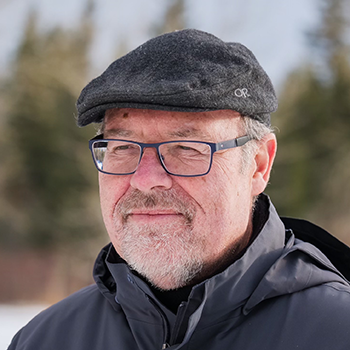
February 3rdWho are My People?
A Menno Minute
Who are my People?
Apparently my first language was Low German – I have no memory of that but buried somewhere in the recesses of my memory are lodged a few expressions and a surprising familiarity with the language. For the most part, Low German was the language of choice for my parents when they didn’t want us kids to know what they were talking about, and I had a vested interest in never letting on that I could understand anything of what they spoke! My family’s move from Tofield to Calgary in the early 1960’s marked another significant departure from any regular interaction with family and others who might be more comfortable with Low German.
I recently read a book Menno Moto which resonated with my sense of having a somewhat buried and forgotten identity. The author, Cameron Dueck, travels by motorcycle from the Red River region of Manitoba to Argentina, visiting with as many Old Colony Mennonites as he can along the way.
Dueck moved away from his home in the Inter-lake region of Manitoba, leaving behind his life as a Mennonite in a very traditional community. His home is now in Hong Kong where he lives and works as a writer. He embarked on this journey as something of a quest to explore his roots, family connections, and sense of identity and belonging. It seemed he did not start out with a strong sense of who he was or even if he self-identified as Mennonite at all, although his love for Mennonite foods had not abated!
During this journey, Dueck visited Mennonite Colonies in Mexico, Belize, Paraguay, Bolivia, and Argentina, and he found relatives all along the way. These visits could very well have served to reinforce for Dueck the reasons he left all this behind, but they also re-connected him to his own story and sense of identity.
The “ghost rapes” that took place on one colony in Bolivia (written about by Miriam Toews) was by far most disturbing and repulsive to Dueck. And yet, he reserved judgement, listened to all perspectives, and didn’t find it necessary to denounce everything about life in that place.
Toward the end of his journey he finds himself staying with a Mennonite family in Argentina. He describes having medach’schlop in his tent and hearing the girls from the family discussing him nearby. Trying to figure out who he is, one asks, “is he a weltmensch?”. No, he’s a Mennonite but not like us. He speaks Plautdietsch, and says he comes from those Mennonites in Canada.”
Dueck smiles, and says to himself, “Yes, I am a Mennonite.”
I was struck by the rawness and honestly of Dueck’s journey and wondered how much energy I and “my people” have put into distancing ourselves from what he discovered. I wonder what my journey would look like, who I would encounter, and how my sense of identity might be enriched.
In a recent Canadian Mennonite article, Troy Watson describes a visit to Scotland to reconnect with the places of his ancestors. I was impressed with the sense of belonging, peace, and calm that he seemed to experience in this journey.
While I am quite unlikely to recover Low German, I have had a few occasions recently to visit Low German speaking people in a few Alberta communities. To my surprise, I could follow enough of the conversation to usually catch the drift of what they were talking about with the help of them throwing in the occasional English word! More significantly, I felt a sort of affinity with many of these people; there was a sense of kinship that was stirred in me.
Menno Moto reminded me of the importance of identity, of belonging, and of being curious about the identity of others. Who are my people? Who are your people? Perhaps a healthy starting point for respectful relationships!